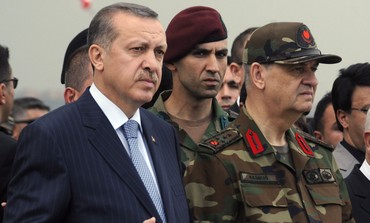Turkey warned Syria again on Tuesday that it would not hesitate to retaliate for any strike on its soil as the country’s top military commander visited troops stationed at the reinforced border.
 Turkey warned Syria again on Tuesday that it would not hesitate to retaliate for any strike on its soil as the country's top military commander visited troops stationed at the reinforced border.
Turkey warned Syria again on Tuesday that it would not hesitate to retaliate for any strike on its soil as the country's top military commander visited troops stationed at the reinforced border.
"It has become inevitable for our armed forces to retaliate in kind... as the Syrian administration maintains its aggressive position," Prime Minister Recep Tayyip Erdogan told lawmakers from his ruling Justice and Development Party (AKP).
Armed forces chief of staff General Necdet Ozel was inspecting troops on a tour of the heavily fortified border region on Tuesday after a number of shells landed on Turkish soil, including one strike that left five civilians dead last week.
After the unknown-source shelling in the village of Akcakale on Wednesday, the Turkish parliament gave the government the green light to use military force if necessary to defend its borders.
Turkey bombarded Syrian army positions again on Monday after a new shell strike on another border town.
"Troops loyal to the Assad administration are shelling our territory... We are retaliating in kind. We are currently doing whatever the rules of engagement require us to do," said Erdogan.
He vowed to take any measure in the face of any Syrian threat to Turkish national security, saying: "The requirement of being a state means we must take any measure and be prepared for any possibility."
Turkey has boosted its military defenses on the volatile border over the past week, stationing tanks and anti-aircraft missiles there as well as troops.
Last Wednesday's incident was the most serious between Damascus and Ankara since Syrian anti-aircraft fire brought down a Turkish fighter jet in June.
On Sunday, a Turkish daily admitted that the five Turkish civilians killed in the shelling were murdered by Erdogan’s weapons which he smuggled to the military opposition groups operating in Syria.